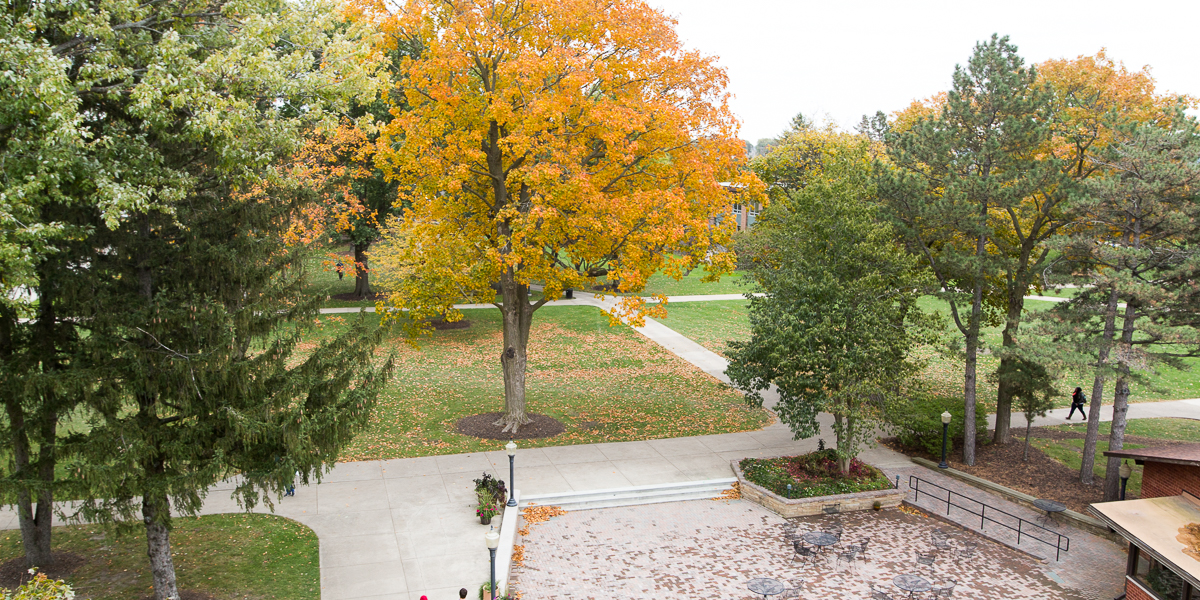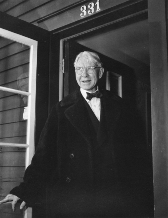

Venture Boldly

Knox College Library
2 E. South Street
Galesburg, IL 61401

Given at the Rededication of Old Main, 1937
 Old and tarnished is the saying, "Time is a great teacher."
Old and tarnished is the saying, "Time is a great teacher."
Many here today feel that if Old Main of Knox as a living structure could speak for itself it might say: "I am a child of time. I celebrate the dignity, importance, and pathos of time.
"Time used me with snow and rain, wind and frost, rust and rot, till I was falling away. Unless loving and thoughtful hands had come to help me I would have prepared to vanish and become dust in the wind, a shattered form and a forgotten melody, a house melted into thin shadows.
"Here to my doors have come the feet, faces, and voices of the young.
"Here from my windows generations of the young have gazed out on the world, gazed in on themselves, some asking questions. 'How and why do we live? And while we live what is worth looking at, what is worth listening to? what might be worth dying for?'
"Shoes have worn my doorsills, sleeves smoothed and softened my banisters, cries and laughter tumbled along my hallways, human associations making me across the years into a breathing instrument."
Yes, Old Main could tell today of the workings of time, how time keeps secrets, how time translates practices and institutions of one age into programs and establishments yet to be tried under hammers and tested on anvils, how time is a destroyer and yet a grower and a healer too, how there is no answer to some questions unless in the ancient saying, "Time will tell."
Those Knox pioneers of 1837, the year Abraham Lincoln moved from the village of New Salem to begin law practice in the city of Springfield, how could either they or young Lincoln read the fog, the mist, the faint cross lights of the future?
How could they know they were a fated bridge generation?
Who could tell them they were moving from a society of farmers and land culture into a machine age where the claims of a new system of industry, transportation, finance, and its owners and controllers, would bring a changed national picture?
The shrewdest fore-teller among them, in the somber chaos of nearly twenty years later, in his House Divided speech, was to say, "If we could first know where we are and whither we are tending, we could better judge what to do and how to do it."
In the sciences of chemistry and physics then were pioneers restless as any on the western prairies, beginning to perform the impossible things that until done they were told couldn't be done.
Whether you pressed inward to the American mind or outward on the flow of the huge, diverse American landscape, you found personal ambition mixed with love and sacrifice, interwoven with the tantalizing and indefinable American dream.
Was a humanity older than Shakespeare, older than the Bible, trying to arrange a new human scheme for the Old World to look at and be glad over?
Many said no. Many said just that.
It had wonder and mystery.
Many who could not explain it at all were ready to die for it.
Time during this inscrutable drama sent forth fresh generations of young men and women into the doorways of Old Main, sent its boy students out into the agony of the War of the 1860's, saw the plains and valleys to the Pacific filled with networks of human settlements and rails and wires, saw its boy students step forth into the first great World War, saw the machine age blend into the motor and power age, saw a national and a world economic collapse bring questions in weight and consequence the parallel of the issues threshed out by Lincoln and Douglas in front of Old Main here before 20,000 people on a raw, windy October day 75 years ago.
Now the pilots of the night air mail look down on lighted cities struggling with systems of human culture perhaps more complex and variable than any the earth has ever seen.
And these pilots of the night air mail, are they not pioneers as truly as the pony express riders of the old days?
Because the frontier and the free land is gone are we to lose the word "pioneer," had as the wood of an old ox yoke, homely as a one-room log cabin, fierce as famine, flies and vermin, tough and stubborn as men and plows breaking unbroken sod, mystic as rainbow lights on horizons not yet reached by man?
Scholarly engineers and inventors harnessing invisible brute forces to do the heavy and backbreaking work formerly done by man -- are they not pioneers?
Shall we say across the next hundred years there will be more pioneers making headway favoring human solidarity as against war and strife among nations and men, making headway on the conditions to exist between ownership, management and labor, winning changes toward better terms on which human beings shall live?
Yes, there will be generations taking hold as though loneliness and the genius of struggle have always dwelt in the hearts of true pioneers, as though the restless and venturing human spirit shall perform again tomorrow with exploits today declared visionary and impossible.
What young people want and dream across the next hundred years will shape history more than any other motivation to be named.
Youth now living and youth as yet unborn hold the deeds and the secrets of the folds to be unfolded in the shapes to come.
None shall look at this hour and say we did not have hope and faith in them.
The mystery of justice between man and man, nation and nation, shall take on new phases.
Dreamers of deep sacred dreams, finders and welders, sons and daughters of burning quests, shall come.
In plain work done with honesty, in actions of courage and endurance lighted with inner humility, lighted sometimes with a fine balance of motives as between freedom and discipline, they shall clothe human dignity with new and wider meanings.
Old Main as a living instrument today might be saying:
"One thing I know deep out of my time - youth when lighted and alive and given a sporting chance is strong for struggle and not afraid of any toils or punishments or dangers or deaths.
"What shall be the course of society and civilization across the next hundred years?
"For the answers read if you can the strange and baffling eyes of youth.
"Yes, for the answers, read, if you can, the strange and baffling eyes of youth."